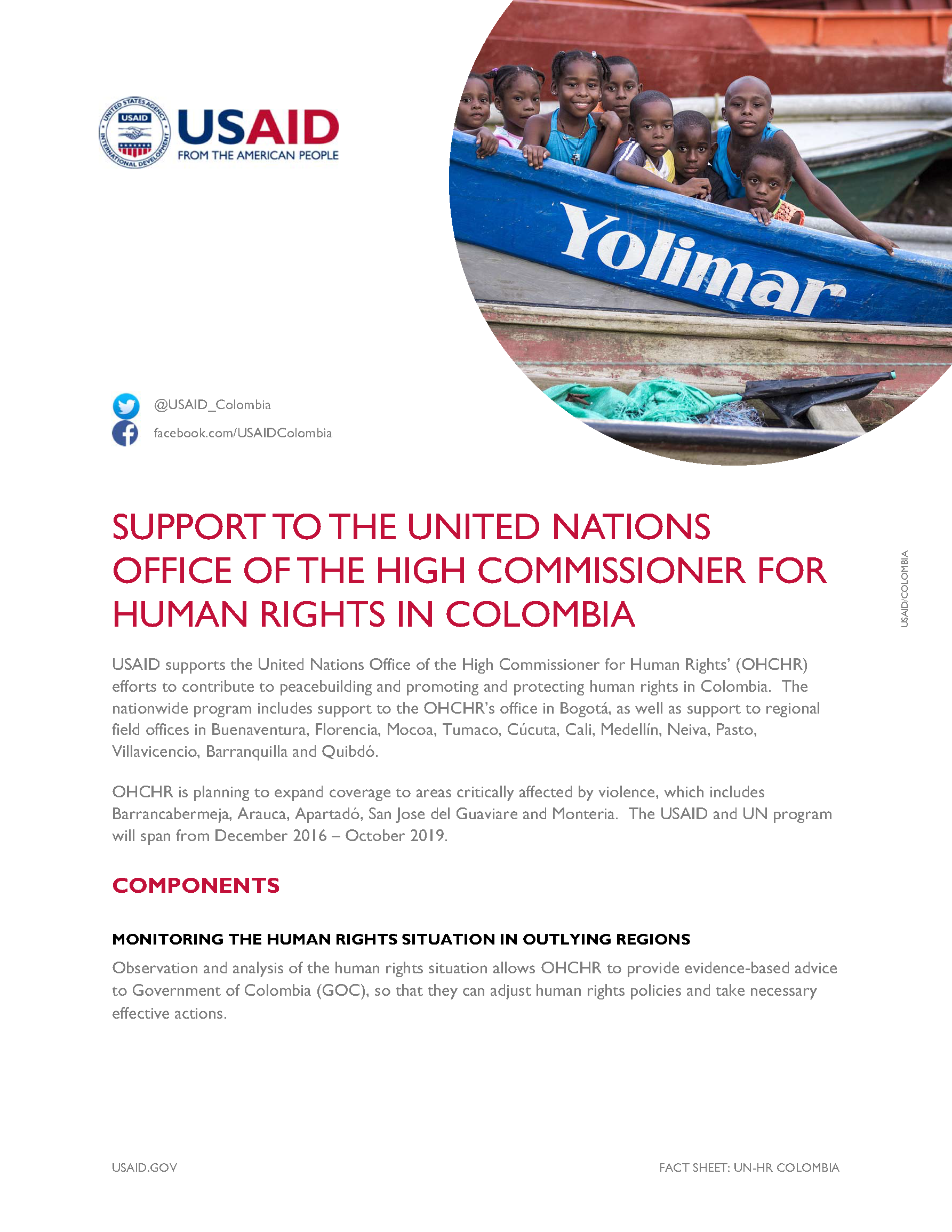USAID supports the United Nations Office of the High Commissioner for Human Rights’ (OHCHR) efforts to contribute to peacebuilding and promoting and protecting human rights in Colombia. The nationwide program includes support to the OHCHR’s office in Bogotá, as well as support to regional field offices in Buenaventura, Florencia, Mocoa, Tumaco, Cúcuta, Cali, Medellín, Neiva, Pasto, Villavicencio, Barranquilla and Quibdó.
OHCHR is planning to expand coverage to areas critically affected by violence, which includes Barrancabermeja, Arauca, Apartadó, San Jose del Guaviare and Monteria. The USAID and UN program will span from December 2016 – October 2019.
COMPONENTS
Monitoring the Human Rights Situation in Outlying Regions
Observation and analysis of the human rights situation allows OHCHR to provide evidence-based advice to Government of Colombia (GOC), so that they can adjust human rights policies and take necessary effective actions.
Supporting Prioritized Communities
OHCHR identifies, addresses and monitors the human rights needs of those disproportionally affected by the conflict, or by violence due to ethnicity, gender, sexual identity, geographic location and other reasons.
Promoting Social Dialogue
OHCHR promotes dialogue among social sectors, communities, government institutions and businesses.
Providing Technical Assistance to Institutions and Businesses
OHCHR assists public institutions, including indigenous authorities, and private companies with integrating human rights standards into public policies, decision-making processes, and business models. The program supports the GOC in the implementation of the peace accord with the FARC by monitoring the compliance of human rights commitments; providing technical assistance with regard to security guarantees for communities and social leaders; and providing evidence-based recommendations to government institutions with respect to the implementation of the special jurisdiction for peace and the victims’ chapter.
RESULTS
- Supported the Attorney General’s Office (AGO) in developing case evidence to prosecute intellectual authors of extrajudicial executions.
- Contributed to an increase in the number of high-ranking officials being investigated, improvement in case evidence, and more effective management of the AGO’s workload. This was done through the help of a secure information system that tracks cases with common patterns by collecting evidence, identifying patterns, and geographically mapping over 3,000 killings.
- Contributed to fulfilling the right to truth and justice of victims of extrajudicial execution and forced disappearance.
- Supported the AGO’s Unit of Human Rights in successfully challenging , through a Tutela writ, the judicial ruling that transferred cases of extrajudicial executions from civil courts to military courts. This prevents new cases from being transferred to the military justice system, and sets a basis for the constitutional review of the Military Jurisdiction Reform passed in Congress.
- Assisted in the creation of strategies for improved protection of human rights defenders.
- Provided technical assistance to the AGO in designing an investigation strategy to prioritize cases of attacks on human rights defenders and land restitution claimants. Violence affecting indigenous and Afro-Colombian leaders, and land restitution claimants is prioritized.
- Facilitated dialogue between GOC institutions and local communities in agrarian and indigenous protests and strikes in the conflict-affected regions of Cauca, Catatumbo and Bajo Cauca.
- Advised government institutions on legal human rights standards about the use of force in addressing social tensions.
- Promoted dialogue among indigenous communities, government institutions and mining companies in southern Cordoba and Bajo Cauca Antioqueño. Support included integration of human rights responsibilities into business operation manuals.








Comment
Make a general inquiry or suggest an improvement.